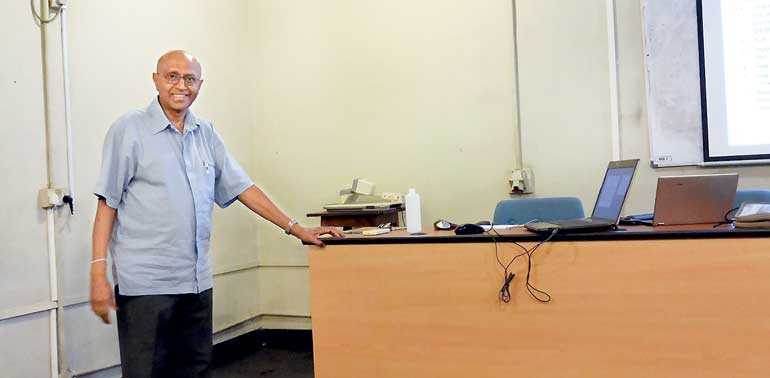Thursday Feb 26, 2026
Thursday Feb 26, 2026
Tuesday, 5 March 2019 01:28 - - {{hitsCtrl.values.hits}}

As another milestone of monthly ‘Katha-Baha’ session organised by Department of Chemical and Process Engineering, University of Moratuwa, a public seminar on upstream oil and gas exploration and production industry under the topic ‘Oil and Gas Industry Value Chain – Big Picture, Why LNG?’ was held on 7 February in department seminar room.
‘Katha-Baha’ session is a monthly public seminar series organise by the department bringing the industry and alumni to meet the student to discuss on various topics related to chemical and process engineering.
Demand for energy is rapidly increasing in each day and there is an essential need of clean, affordable and secure way to satisfy increasing energy demand. Nalin Gunasekara, who has spent more than 37 years in oil and gas industry was the speaker of the session. He is specialized in monetising challenging offshore fields across numerous jurisdictions globally and currently reside in Perth, Australia.
The audience consisted of academic staff members and students of the university and the talk was started with an insight on oil business – a high risk, high reward business. The realistic status of the industry was discussed giving the uncertain trajectory the industry faces, along with the associated aspects with regard to energy/power production-being the current global focus. It was highlighted that there is an interesting tussle going on in the process to bring LNG to Sri Lanka.
The oil and gas industry is now at its crossroads, with other preferred primary energy sources gaining ground. However, weaning away from the dependency to fossil fuel industry remains difficult for poor countries.
High percentage of clean renewables still are unaffordable, except for the rich. Consequently, talk covered topics like energy crisis and LNG, energy independency, key sectors in supply chain, impact of time value of money on oil business and future trends such as transition of oil and gas industry as upstream processes power generators.
Importance of sensitivity analysis was illustrated with the world’s best gurus having failed in their judgement resulting sometimes in unintended consequences, showing the risks faced by oil companies and the end users.
More importantly, Nalin discussed on global and SL status on upstream processing reflecting on Mannar basin option, which is a deep-water complex reservoir. According to him, oil and gas industry is the heart of the oil business and Sri Lanka is in a vulnerable state in going in to oil business due to weak financial status and mitigation of the risk requires an understanding of the value chain. Because any failure could be catastrophic for national budget. As well, he highlighted that importance of relationship between Government and private sector for the success of oil exploration project in Mannar.
Being an engineer, he finished his speech with sharing his experiences on leading projects emphasising the importance of development planning and its impact on earning power of a project. Thus, he mentioned that, owing to the education he got from Sri Lanka, if an opportunity arise, he is willing in giving an understanding of the value chain to overcome the current state of confusion in the energy policy paralysis.